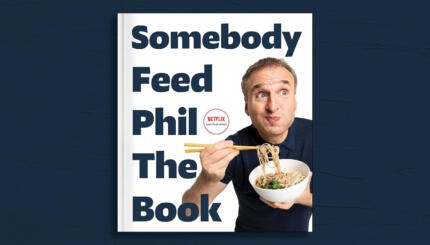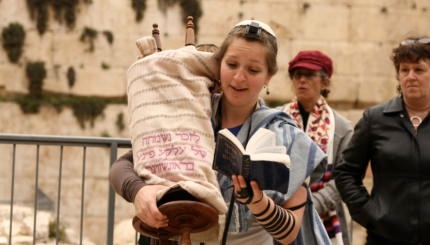Luzer Twersky is an actor who plays Mendel in Season Two of Amazon’s hit television show “Transparent.” He grew up in an insular Hasidic community in Brooklyn, which he left in his early 20s, with help from Footsteps, an organization that helps formerly ultra-Orthodox Jews integrate into mainstream society. He is best known for his role in the film “Félix & Meira,” which is Canada’s submission for the Best Foreign Language Oscar this year. Luzer spoke with Keshet’s David Levy last week after the first episode of “Transparent” was released.
DAVID LEVY: Let’s just start by saying congratulations on being part of “Transparent.” Have you had the opportunity to watch the finished product yet?
LUZER TWERSKY: I watched the first episode of the new season, and it’s very good. I’m very happy with it and very proud of it.
DL: I saw your name in the credits but didn’t spot you in the episode itself. I assume you’re in the German flashback?
LT: In the first episode I’m a little “blink-and-you-miss it.” These flashbacks will happen all season. You’ll see the parallel between what’s happening at the wedding with all the dancing and the craziness and what’s happening at this party filled with queers and gays and gender-fluid people, and then you see those same kind of people 100 years ago in Berlin. And you also notice that Simon, Maura’s nephew, seems to be in those scenes in Berlin. It’s all going to tie together.
And then you’ll notice at the end of the episode, when you see Ali standing on her balcony, and then you see someone next to her who we had seen dancing in that Berlin scene.
READ: “Transparent” Season 2: How a Jewish Trans Father Inspired a Hit Series
DL: I don’t want to put you in the position of having to spoil anything, but can you talk at all about the character you are playing?
LT: In the first season, we saw flashbacks to Maura’s early years of exploring her gender issues. This time, we go way further back into the family’s history, to Grandma Rose’s generation to look at what happened there.
The character that I play – it’s hard to say without giving away a lot – but there’s a group of sexually fluid Jews in 1930s Berlin who were friends of the Pfefferman family. I’m a family acquaintance at that time. Of course, they weren’t Pfefferman yet, because Grandma Rose wasn’t married yet.
DL: To what extent is it just like any other acting project – you get your scripts, you learn your part, you do your thing – and to what extent is “Transparent” special? Is there an element of education for the cast?
LT: It couldn’t be any more different. You hear a lot about how shows can feel like families, but it was really true here.
Jill [Soloway, creator of “Transparent”] reached out to me – I think she had read about me and the movie “Félix & Meira” in the New York Times – and she just offered me a role. Of course I said, “Yes, yes, I’ll do it!” And then she checked in, “Does it matter that he’s gay?” And I was still like, “Sure, sure, I’ll do it!” And once the cast was assembled, she brought us together for an improv workshop. They got us all in a room and gave us scenarios. The writers were in the room with us, and they took notes, writing down stuff that we said or did as well as emotional notes. We did that for three days, and then the writers took all of their notes and went to the writers’ room and wrote the scripts. Then we did something with a filmmaking lab lead by a filmmaking guru named Joan Scheckel. Where after the writers have already written the script, we talked about the arc of the season and how we can parallel that with our own experiences to access the emotions. It was a very intensive effort. Everyone’s there, working through this emotional rollercoaster of a season, but not necessarily from the script, just through emotional exercises. And then when we finally come on set, you finally shoot the script – but not really. She never yells “action” or “cut.” There’s a fluidity to the set.
At the beginning of the day, each day, Jill makes a motivational speech about how we’re doing important work: It’s not just a TV show, it’s a revolution, and it’s changing the world. And it absolutely is. She’s not just making stuff up. This can change the world in many, many ways.
And then we just shoot. They turned the music on and let everyone do their thing, and the cameras would just roll around. I don’t know if you’ve been to many sets, but this is unlike any other set I’ve ever been on.
DL: Prior to “Transparent,: had you done any projects that had LGBT content?
LT: This was a first.
DL: Was there any hesitation? I know sometimes actors are warned about getting put into boxes in their careers.
LT: Not at all. I never say no to anything, as long as I believe in the project. The only thing I’d say no to is cookie-cutter garbage. I had no hesitation about this at all. Where I come from, they would tell you they don’t have any homosexuality at all, so it’s like I ran as far as possible in the other direction.
DL: It seems to me that leaving an insular Hasidic community might be a little bit like coming out: figuring out you are different and then keeping a big secret until you have the courage to tell people. What was that experience like for you?
LT: In my case, I was “outed” more than I “came out.” I was leading a double life when I was 22, and then my wife and I abruptly got divorced, and that’s when I had to tell everyone. It was kind of like I was forced to reveal my “true self” and it didn’t go well. My parents didn’t speak to me for many, many years – six or seven years, and there are still members of my family who don’t speak to me.
But I’m always very careful to compare. Here’s the thing: you’ve got to be super careful to compare yourself to anyone else’s plight. It’s like Jews get super-sensitive when you compare anything to the Holocaust. I try not to compare: my experience was like my experience. I can’t possibly understand what it’s like for a person to come out. Abby Stein is my cousin, twice. She’s my second cousin on my dad’s side and she was married to (and now divorced from) my first cousin. I can’t imagine being in her shoes.
DL: How did you get involved with acting?
LT: It crossed my mind in early childhood. I always wanted to be a performer, but there wasn’t a lot of opportunity. I had been in school plays and camp plays, but I didn’t know you could do this for a living. I wasn’t aware of movies. It really started to happen in my head when I started watching movies when I was 20. I was married, and I had some privacy, and I had some autonomy, so I got a computer and could start watching movies.
READ: Showbiz Meets Shtetl: Helping Hollywood Get Hasidim Right
At first I sought out films that had Hasidic characters because we all want to see ourselves on screen. So I saw “A Price Above Rubies,” “A Stranger Among Us,” and some other ones, and I watched and thought, “These people just don’t get it.” Everything was wrong – the costumes were wrong, the stories didn’t make any sense. I thought, I’m going to become an actor, and I’m going to make this right. I’m going to tell our story, and I’d be better as an actor because I’ve seen Hasidic Jews and know that’s not how they act, that’s not how they talk.
Hasidic stories have become very popular, really starting with Hella Winston’s book, Unchosen, which also put Footsteps on the map. There started being a lot of interest in the community: episodes of “This American Life” and other shows telling stories about Hasidic Jews. I thought a lot of these stories would make good material for a film. It wasn’t easy finding work. I didn’t have the connections with the movie business. I would find gigs on Craigslist, do student films. Slowly but surely, things came around. But watching films that had those Hasidic stories in them was what gave me the boost to jump in.
READ: “Hasidic Rebel” Shulem Deen on Leaving Orthodoxy, Losing His Children
DL: So when did it shift from “I want to help them tell our stories more accurately” to “I want to be a part of that world and not that world that I’m coming from?”
LT: They’re not that closely related. My decision to leave the Hasidic community had a lot more to do with that I don’t believe in Orthodox Judaism, I don’t believe in that definition of God, and that lifestyle didn’t work for me. It was really independent of the acting thing. It’s not like I left the community because I wanted to be an actor. That’s part of it, but it wouldn’t have been enough. I had reached a breaking point in my life: I had tried and tried and tried and it just wasn’t working for me.
Without Footsteps, I would never be here. I would never have made it this far. I heard about them from Hella Winston’s book and got in touch with them. I’ve been a member now for about six or seven years – since I left I’ve been a member. I couldn’t have done it without them. I try to be helpful as much as I can to return the favor.
(Photo by Ella Hatamian)
About Footsteps: Footsteps is the only organization in North America that provides comprehensive supports to individuals grappling with the consequences of leaving ultra-Orthodoxy. Through its social, emotional, and practical support services, Footsteps has assisted more than 1,100 men and women define their identities, build communities and lead self-determined lives.
Like this post?
- Join the conversation through MyJewishLearning’s weekly blogs newsletter.
- Get breaking LGBTQ Jewish news, resources and inspiration from Keshet in your inbox!
Hasidic
Pronounced: khah-SID-ik, Origin: Hebrew, a stream within ultra-Orthodox Judaism that grew out of an 18th-century mystical revival movement.


